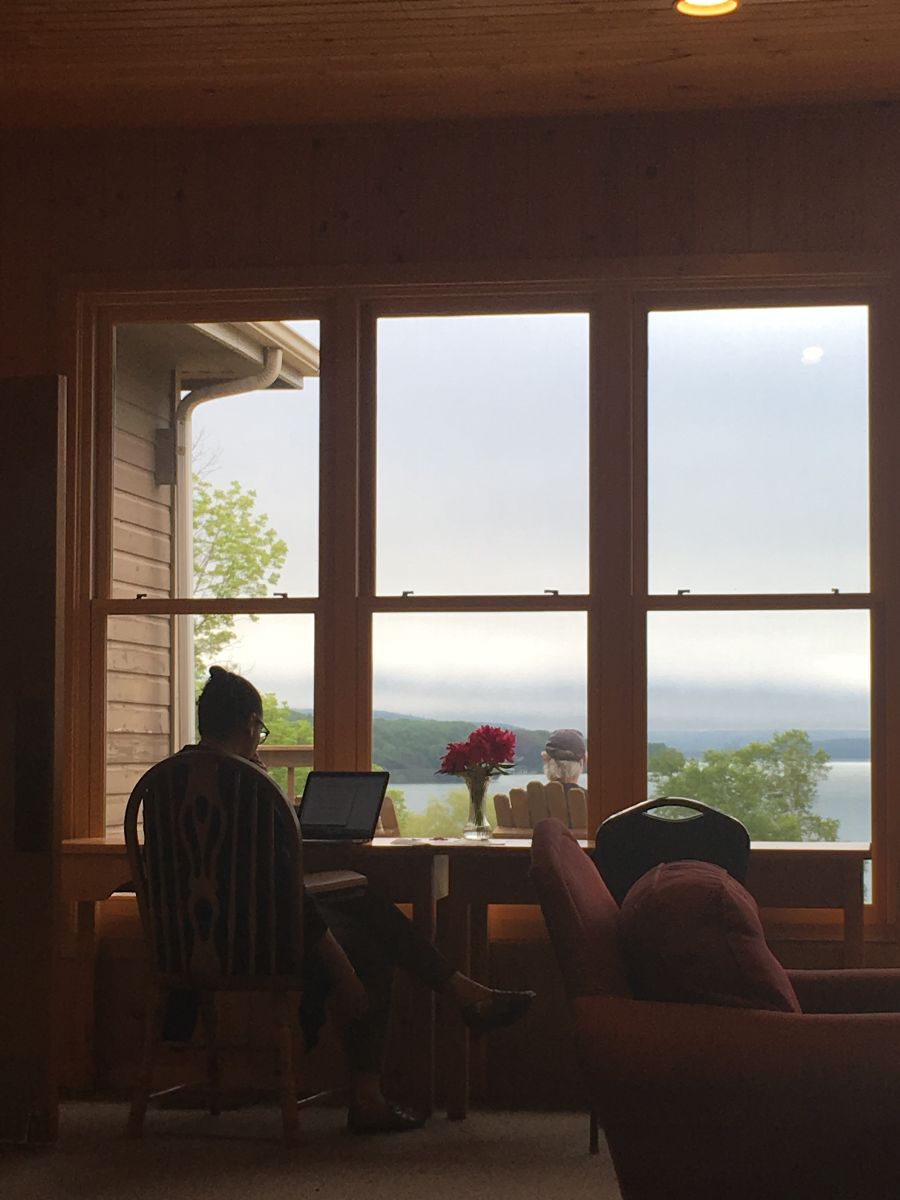First Wayne State students attend the Bear River Writers Conference on scholarship
By Ariel Mokdad and Benjamin Earl Turner
The Bear River Writers' Conference, a five-day writing intensive on the shores of Lake Walloon near Boyne City, Michigan, was for Wayne State University students a baptism into the wider literary community. As representatives of our M.A. English program's Creative Writing emphasis, Megha Krishnan, Kamelya Youssef, Ari Mokdad and Benjamin Earl Turner had the privilege of engaging in creative and critical discourse regarding the craft of writing with approximately 100 other attendees and a nationally-recognized faculty. For example, it was a rare honor for us to be able to listen to craft talks by fiction writer and poet Stuart Dybek, sit in workshops with fiction writer Lolita Hernandez, and engage Jamaal May, a prominent Detroit poet, in critical conversation in a gazebo facing Lake Walloon, all in one afternoon.
This is typical of the transformative cultural and creative space University of Michigan and the Bear River Writers' Conference has carved out for students. This immersion in literary culture was more than just an opportunity to hobnob with well-awarded authors. Our collective network as WSU students expanded beyond Wayne State as we took on the roles of both colleagues and students. Each of us found new connections with faculty and writers from all over the country, while also benefitting from the inclusionary pedagogy that is practiced there.
We would contend University of Michigan's initiative to increase scholarships for the conference and partner with other programs was a concrete demonstration of what it means to build inclusive community. Further still, while our engagement with, for example, Oakland University and U of M students, veteran conference attendees, and high profile writers was an opportunity to expand our writing networks and engage with a wider writing community, our skills as writers were also sharpened in that short five days.
The three-hour per day workshop format, complete with homework, craft talks, readings, and free time to write, served to build an environment where success was guaranteed. Success understood in this context is putting the pen to the page and generating new work. The knowledge and capability of workshop leaders, as well as the overall free exchange of information, gave us an opportunity to sharpen our skills both in and out of our respective writing genres. There are two other critical advantages to this conference that must be mentioned.
First, the camaraderie of our own cohort has been amplified a thousandfold. We are more excited about each others' work, and it has also reminded us of the writing ability and rhetorical power within our own circle. Second, we were able to demystify what it means to be a successful writer, in part because of the work of our professors. Having read memoirist and poet Thomas Lynch's work in a seminar Dr. Maun taught in Winter 2017 and then watching him in person read a piece he'd written the first morning of the conference, the reality dawned on us: what we are all doing is writing in the present moment. We found safety in that fact.

While being at the conference was exciting for all these reasons, the four of us also experienced a profound sense of gratitude and pride at the opportunity to represent our university in excellence. Each of us took to the stage, read, and were beyond well-received. Ari and Benjamin, after having performed a multi-modal performance work developed while at the conference, are still trying to process the experience. The reality is that outside of such an intentionally creative space, we would have never worked on a piece that received a standing ovation.
For us, we were rendered capable and had a confidence in knowing Wayne State English professors like Donovan Hohn and Dr. Caroline Maun were always doing their best to put us in positions to succeed. In fact, Ari and Benjamin were so compelled and moved by the response to their work, that they decided to craft a long-form version of the piece through a Directed Study course over the fall semester with Professor Liebler.
These are the kinds of intangible and unpredictable results we've been privileged to experience with the other attendees of the Bear River Writers' Conference. Hemingway was up to something when he settled next to those waters to write. Whether he knew it or not, he was part of a legacy of writerly excellence of which we are so honored to take part.